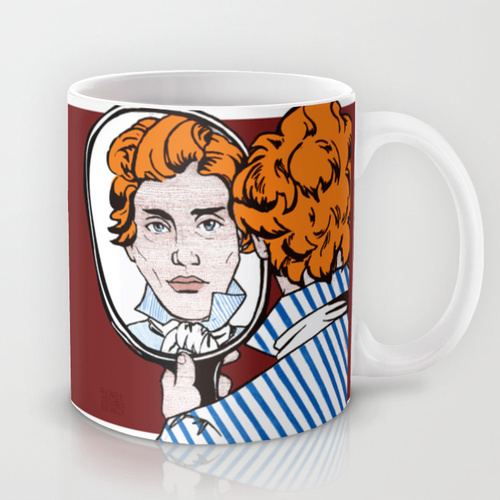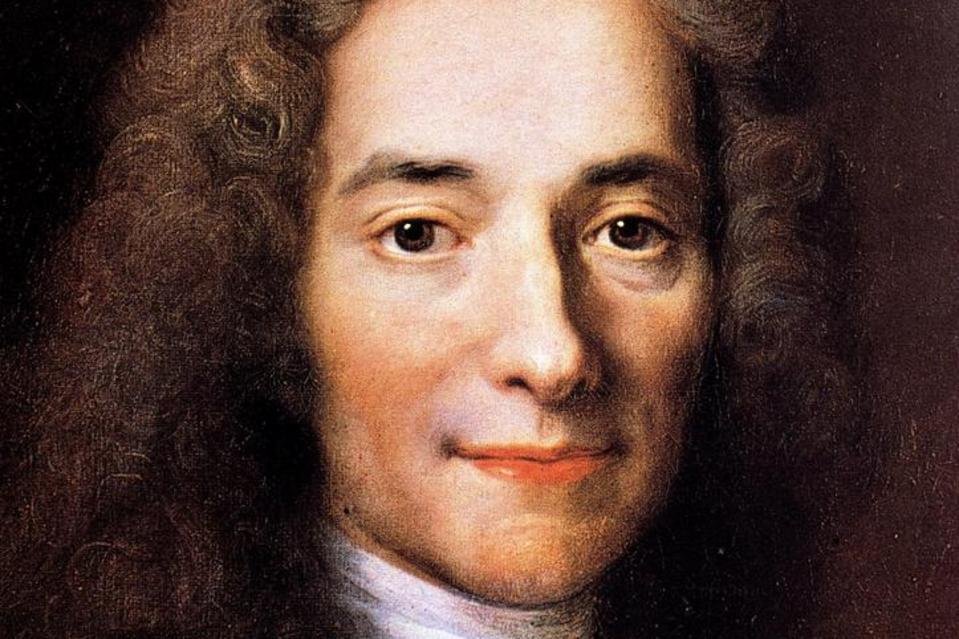I think I speak for many of us when I say that coffee fuels our greatest intellectual efforts. And even as we get the jitters and leave brown rings on our desks, we can take comfort in the fact that so it also went with some of the most notable philosophers in the history of the discipline. As far back as the 18th century, no less a writer, thinker, and agitator than François-Marie Arouet, better known as Voltaire, “reportedly consumed somewhere between 40 and 50 cups of joe a day, apparently of a chocolate-coffee mixture. He lived into his eighties, though his doctor warned him that his beloved coffee would kill him.”
That comes from Amanda Scherker at The Huffington Post writing up “9 Famous Geniuses Who Were Also Huge Coffee Addicts.” Voltaire’s java habit also comes up on “10 Odd Obsessions of Famous Philosophers” by Virginia Muir at Listverse, who names his drinking venue of choice (the Café Procope in Paris) and indicates the extent of his enthusiasm by noting that “he even regularly paid exorbitant fees to have luxury coffee imported for his personal use” — which certainly doesn’t seem so eccentric today.
Later that century, Immanuel Kant took up coffee in his last days. Writing first-hand on the subject in the aptly titled The Last Days of Immanuel Kant, Thomas De Quincey (no stranger to life-changing habits himself) describes the philosopher’s “custom of taking, immediately after dinner, a cup of coffee,” a ritual he so came to relish that, whenever he sensed he may not get his new favorite beverage, there “commenced a scene of some interest. Coffee must be brought ‘upon the spot’ (a word he had constantly on his mouth during his latter days) ‘in a moment.’ ” Knowing this would happen, De Quincey made sure “the coffee was ground; the water was boiling; and the very moment the word was given, [Kant’s] servant shot in like an arrow and plunged the coffee into the water.… But this trifling delay seemed unendurable to Kant.”

(pictured: Søren Kierkegaard coffee mug)
In the 19th century, Søren Kierkegaard would also get into a coffee ritual. He “had his own quite peculiar way of having coffee,” writes biographer Joakim Garff. “Delightedly he seized hold of the bag containing the sugar and poured sugar into the coffee cup until it was piled up above the rim. Next came the incredibly strong, black coffee, which slowly dissolved the white pyramid.” I always drink it black myself, but who among us dares think ourselves too good for the teeth-aching preferred by the author of Fear and Trembling?
We must always bear in mind, too, that while coffee may constitute a necessary condition for our intellectual achievements, it never constitutes a sufficient one. Before pouring your next cup, whether your first of the day or your fiftieth, whether before or after dinner, and whether into a pyramid of sugar or not, ask yourself how much progress you’ve made on your own Candide or Critique of Pure Reason. A sobering question, to be sure — but after enough caffeine, you feel pretty sober anyway.
Related Content:
Free Online Philosophy Courses
The Coffee Pot That Fueled Honoré de Balzac’s Coffee Addiction
“The Vertue of the COFFEE Drink”: London’s First Cafe Creates Ad for Coffee in the 1650s
Colin Marshall hosts and produces Notebook on Cities and Culture as well as the video series The City in Cinema and writes essays on cities, language, Asia, and men’s style. He’s at work on a book about Los Angeles, A Los Angeles Primer. Follow him on Twitter at @colinmarshall or on Facebook.




Great video here on the way in which coffee fueled the Enlightenment:
https://www.youtube.com/watch?v=tsFxH2zdi_Y
The move from alcohol to coffee, depressant to stimulant, allowed for greater creativity.
I wouldn’t put too much stock in Garff’s description of Kierkegaard’s coffee drinking habits. His biography of Kierkegaard has been shown to be wrong on a number of the details of Kierkegaard’s life. See: http://pietyonkierkegaard.com/2012/08/23/kirmmses-cover-up/
Dear Carol,
As a member of the British Humanist Association I attended the Bentham lecture, which each year celebrates Jeremy Bentham a 18 th century celebrated person whose Mummy decorates one of the Colleges of London University.
The subject was by a Prof of Philosophy Rae Langton, if I have remembered her name correctly. She talked of Kant and his respect for the Person. I emailed her to ask if she knew of Dr Carl Rogers and attached the six conditions. She did not know of him. For me he is a philosopher in as much as his training for counsellors had a new philosophical under core, but he has never been mentioned in my reading of philosophers. But perhaps I am out of date in my literature reading, as I am on several other topics.
Happy New Year to you and yours Carol